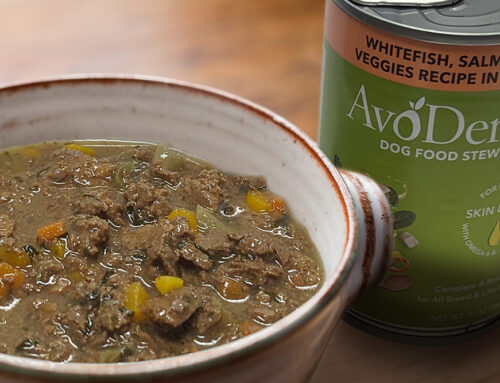As the ACE of fruits (and an MVP in guacamole), avocados have caught the world by storm as a rich source of nutrients with versatile cooking value. It’s no wonder that dogs and pets everywhere want to get in on the goods—our product line first flourished in the 1980s, when an avocado farmer proposed a partnership after discovering how much his own dogs loved avocados.
Despite the raving reviews from our company’s furry founders, there has been some debate in pet health circles surrounding the question: can dogs eat avocado? Read on to discover for yourself the safety and health benefits of avocados for dogs.
Benefits of Avocado for Dogs
Avocados are rich in folate, potassium, niacin, and essential fatty acids, all of which contribute to the strength and luster of your dog’s coat. Why you may ask, are they so essential? Dogs are unable to synthesize the right amount of fatty acids needed to meet their metabolic needs. In order to maintain the proper nutritional balance that’ll keep your pup looking his or her best, a dog’s food and diet should include ample amounts of the nutrients they need.
Avocados are also abundant in vitamins A, C, and E—and B6, for good measure. In addition to supporting bone health and keeping your pet’s coat at its best, these vitamins also support your dog’s eyesight as well as the nervous and circulatory systems.
Can Dogs Have Avocado?
Avocado contains an oil-soluble compound called persin, which is very similar in structure to fatty acids. Persin is toxic to fungi and can cause lasting health issues to small mammals such as rabbits and mice. Your dog, however, has much better odds: avocado fruit and oil are safe for dogs and cats to eat, as they are better at breaking down persin as a fatty acid. Some humans may have an allergic reaction to persin in avocados, but it’s rare for dogs to share the same allergy.
Parts of the avocado plant—namely, the leaves and bark—can be toxic and lethal to dogs. Additionally, the seed of the fruit can be a dangerous choking hazard, obstructing the esophagus, stomach, or intestinal tract. Fortunately, these parts of avocado are left out of meals and grocery store aisles. So, when it comes to the anatomy of an avocado: if it’s edible to you, it’s safe for your pet.
What to do if your dog eats avocado:
- Check the label: Some Guatemalan varieties of avocado have higher toxicity levels than the avocados in AvoDerm dog food.
- Keep the pit out of reach: When it comes to good food, dogs seem to love a challenge. However, bulky avocado pits can do serious damage to the inside of your pet. Make sure that avocado pits stay away from your dog’s airways and double-check that they aren’t left in easy reach.
- Be sure to share! Pull up a seat in front of a big game or new movie, and enjoy a fun avocado snack with your pet.
Avocado and Dogs
AvoDerm dog food products are carefully made with all of the nutritional value that avocados can muster. The avocado meal and oil found in the AvoDerm menu come from the meat of the fruit, without any of the leaves, pits, skin, or bark that may be harmful to your pet. With only 5.0 grams of fat per ¼ cup serving, avocados are a perfectly healthy and tasty way for dogs to enjoy their food and the luscious coat that comes along with it.





